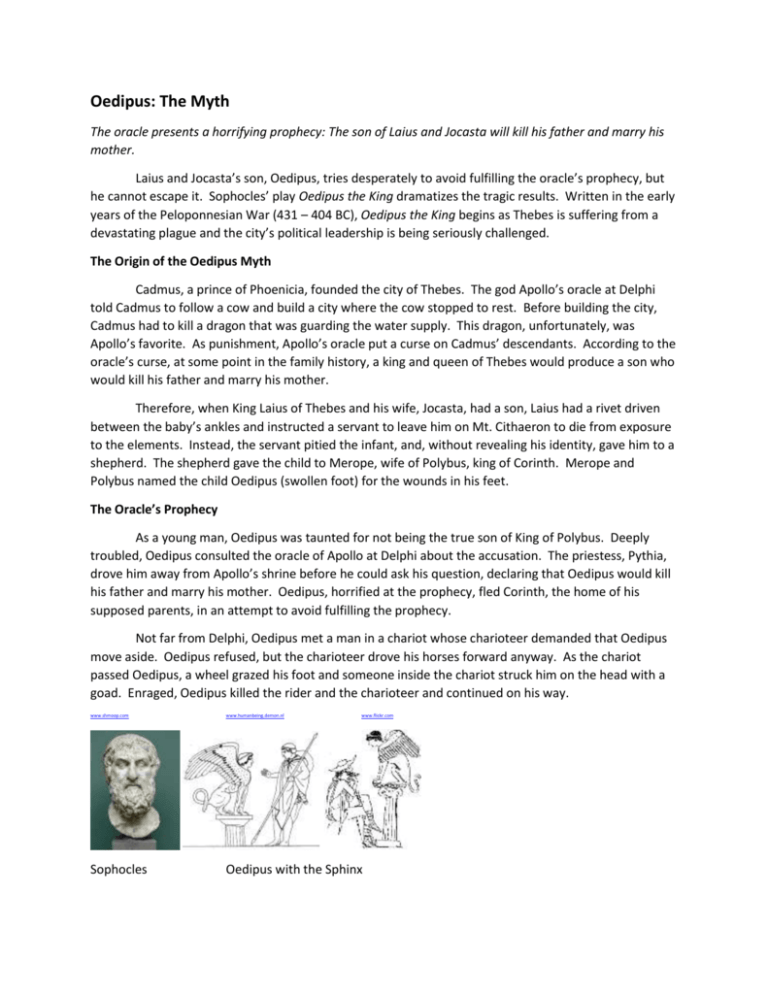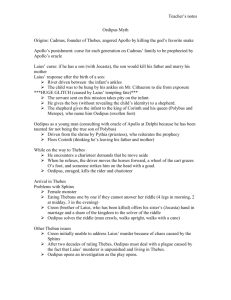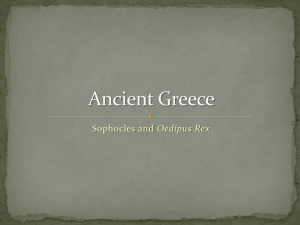
Oedipus: The Myth
The oracle presents a horrifying prophecy: The son of Laius and Jocasta will kill his father and marry his
mother.
Laius and Jocasta’s son, Oedipus, tries desperately to avoid fulfilling the oracle’s prophecy, but
he cannot escape it. Sophocles’ play Oedipus the King dramatizes the tragic results. Written in the early
years of the Peloponnesian War (431 – 404 BC), Oedipus the King begins as Thebes is suffering from a
devastating plague and the city’s political leadership is being seriously challenged.
The Origin of the Oedipus Myth
Cadmus, a prince of Phoenicia, founded the city of Thebes. The god Apollo’s oracle at Delphi
told Cadmus to follow a cow and build a city where the cow stopped to rest. Before building the city,
Cadmus had to kill a dragon that was guarding the water supply. This dragon, unfortunately, was
Apollo’s favorite. As punishment, Apollo’s oracle put a curse on Cadmus’ descendants. According to the
oracle’s curse, at some point in the family history, a king and queen of Thebes would produce a son who
would kill his father and marry his mother.
Therefore, when King Laius of Thebes and his wife, Jocasta, had a son, Laius had a rivet driven
between the baby’s ankles and instructed a servant to leave him on Mt. Cithaeron to die from exposure
to the elements. Instead, the servant pitied the infant, and, without revealing his identity, gave him to a
shepherd. The shepherd gave the child to Merope, wife of Polybus, king of Corinth. Merope and
Polybus named the child Oedipus (swollen foot) for the wounds in his feet.
The Oracle’s Prophecy
As a young man, Oedipus was taunted for not being the true son of King of Polybus. Deeply
troubled, Oedipus consulted the oracle of Apollo at Delphi about the accusation. The priestess, Pythia,
drove him away from Apollo’s shrine before he could ask his question, declaring that Oedipus would kill
his father and marry his mother. Oedipus, horrified at the prophecy, fled Corinth, the home of his
supposed parents, in an attempt to avoid fulfilling the prophecy.
Not far from Delphi, Oedipus met a man in a chariot whose charioteer demanded that Oedipus
move aside. Oedipus refused, but the charioteer drove his horses forward anyway. As the chariot
passed Oedipus, a wheel grazed his foot and someone inside the chariot struck him on the head with a
goad. Enraged, Oedipus killed the rider and the charioteer and continued on his way.
www.shmoop.com
www.humanbeing.demon.nl
www.flickr.com
Sophocles
Oedipus with the Sphinx
The Riddle of the Sphinx
Eventually, Oedipus found his way to Thebes, where the city was in turmoil. A monster called
the Sphinx was terrorizing the Thebans. According to various tales, the Sphinx had the head of a
woman, the body of a lion, the tail of a serpent, and wings. The monster destroyed the Theban fields
and killed many of its citizens, refusing to depart unless someone answered her riddle. Before eating
her victims, the Sphinx would ask them: “What is it that goes on four legs in the morning, two at midday,
and three in the evening?” Until someone answered her riddle, the torment would continue.
A nearby king, Damasistratus, had reported to the Thebans that their king, Laius, had been killed
on his way to Delphi, but the frightened and preoccupied Thebans had no time to seek the murderer.
Their priority was to find someone who could solve the riddle and save Thebes from the Sphinx.
Jocasta’s brother Creon offered the hand of his sister Jocasta, Laius’ widow, and a share in the kingdom
to any man who could answer the Sphinx’s riddle correctly.
The Riddle’s Answer
Oedipus visited the Sphinx to give her the correct answer: “Man, who crawls in infancy, walks
upright in his prime, and leans on a cane in old age.” The Sphinx flung herself to her death, and Thebes
welcomed Oedipus as its new king. Oedipus married Jocasta, Laius’ widow.
Oedipus had ruled for almost two decades, leading the city in prosperity and fathering four
children. Thebes was visited with a plague that killed animals, children, and crops. Oedipus vowed to
rid the city of the plague. The oracle told him that the plague was caused by the fact that Laius’
murderer was living in Thebes unpunished for his crime. As a responsible and dedicated leader, Oedipus
immediately began an investigation to locate the murderer and relieve Thebes of the plague. At this
point in the Oedipus story, Sophocles begins the play Oedipus the King.
kids.britannica.com
Greece
www.worldatlas.com
The Mediterranean World
Work Cited
"Oedipus: The Myth." Prentice Hall Literature. Timeless Voices, Timeless Themes. Ed. Kate Kinsella.
Upper Saddle River, NJ: Pearson Prentice Hall, 2005. 422-23. Print.



